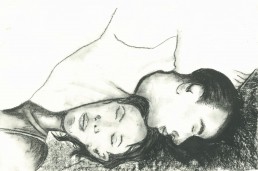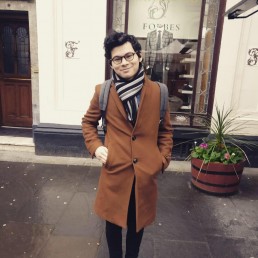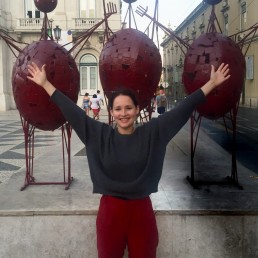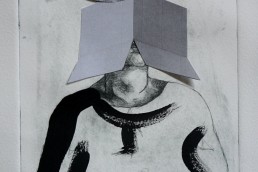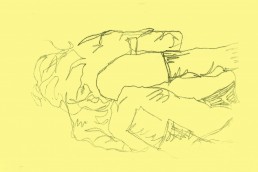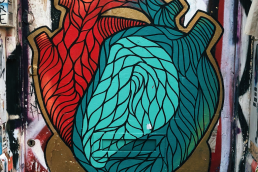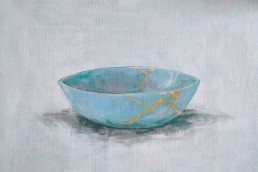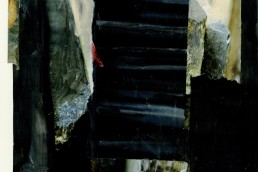By Eoghan Scott
Art by Caitlin Fooks
Almost 3 years on, it still sometimes feels like yesterday, but more often that not like a distant memory.
Volunteering in the ‘Moria’ refugee camp on the Greek island of Lesvos remains an experience I’ll never forget, and I never want to; but right now, as I sit at home with the heating turned on to combat the chill of winter, as I play music in the background, it’s difficult to reconcile my current situation with those days in the camp.
When I think back, I often wonder if we made a difference. What difference can anybody make in two weeks? I say this because I want to be clear from the start. I think I could have done more. In fact, I know I could.
On Lesvos, there were several registration camps attempting to cope with the influx of refugees coming in every day from across the Aegean Sea. Of these, Moria is just as one might imagine; cold and uninviting, thronging with the frightened and bewildered.
In contrast, the island itself is a sight to behold. The city of Mytilene is surrounded by hills and populated with neoclassical buildings that feel a world away from the bleak reality of the camp. The city is what real life should be, but on Lesvos it’s little more than a dream.
Our shabby apartment, lacking heat or comfortable beds, was a grim welcome to the area –- although we had beds, and maybe not heating, but we had a roof over our heads each night. The morning after we arrived, we took our place in the camp for orientation.
Thrown into the deep end from the off, the weather took a turn for the worse just three hours in, gale force winds and torrential rain took place of sunshine, and the barely-livable conditions became all the worse. The evening was spent fixing tents, clearing floods and fighting the elements to keep the place from falling apart.
We arrived back at our apartment that night at 1am, emotionally and physically drained, soaked to our skins, tired and overwhelmed. Lucky to have each other for company, we eventually managed to sleep.
Throughout our time at Moria, we did our best to help out wherever we could. Some of us spent much of the fortnight receiving those arriving straight off the boats, many still soaking wet and often traumatized by their experiences. I found myself heavily involved with the distribution of clothing — as displaced people frequently arrived in, often soaking wet and at risk of hypothermia, we sorted them with fresh and fitting clothes from the donations received, though with the constant inflow of people we always found ourselves running short and in need of more.
With the exception of the few long-term volunteers in the camp, those who arrived to help were usually there a few days at a time. Within a week we had seen others come and go, and despite our own inexperience we often found ourselves forced to take charge – out of necessity, and also because often nobody (least of all ourselves) had a clue what to do. There was never time, you just had to do it.
We did what we could when possible to help, but I hesitate to say we made a difference. Not to say we didn’t help, but we hardly rebuilt the camp from the ground up.
More important than anything were the conversations had along the way. Those in-between moments spent just speaking with people and getting to know them – on reflection, I think those were the moments that truly mattered.
It can be noble for one to set out with the intention to help others, but all too easy to end up seeing those you set out to help as simply no more than “refugees” in need of aid. Life in a camp can be dehumanizing at the best of times, but every human being deserves a sense of community, and to be seen as an equal.
In such a short space of time like a fortnight, it can be hard to make a tangible difference. Having a conversation and listening to others sometimes might just be all that’s needed to paint a picture of people just like us, separated by nothing more than chance and circumstance, and to offer some slight solace in the midst of it all.
Eoghan Scott
Eoghan Scott is a (job-seeking) writer living in Edinburgh, originally from Ireland.
He studied an MA in Journalism at Edinburgh Napier University and is always available to discuss the films of Richard Curtis and Hugh Grant/Colin Firth if you ask nicely enough.
He enjoys reading, writing and a strong yet sugary coffee whenever he can get one.
Caitlin Fooks
Caitlin is currently studying cognitive science at Edinburgh University. She is passionate about understanding the human mind, and spreading that understanding to counteract misconceptions most people hold about their own minds. When she’s not at uni she can be found swing dancing, drawing, writing, reading and watching endless movies.

